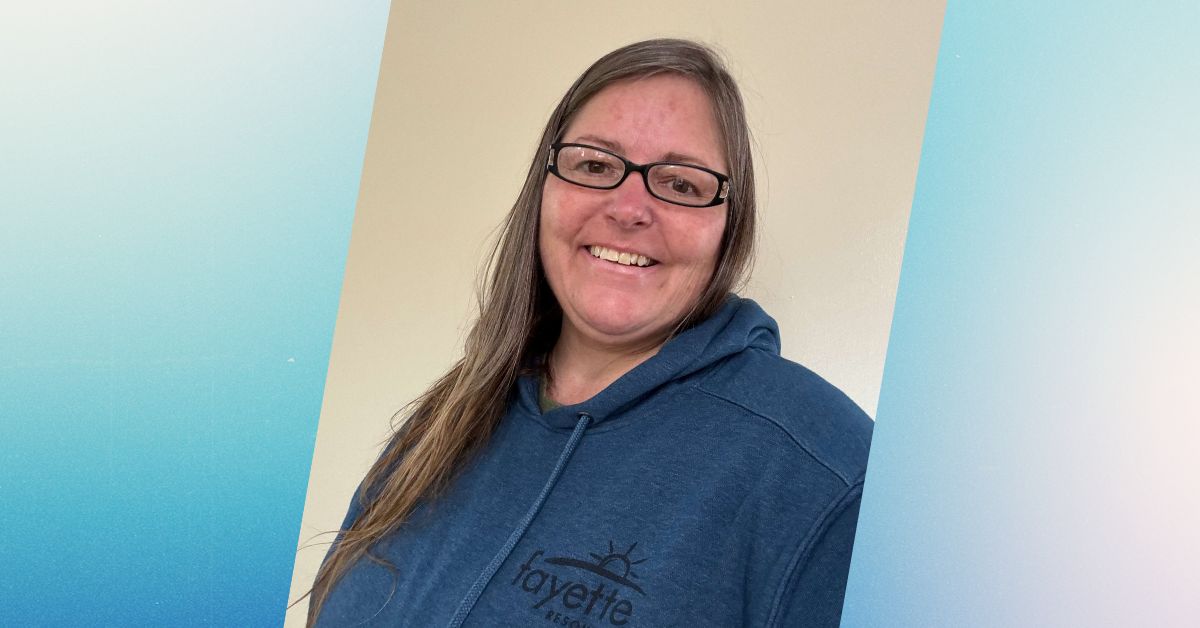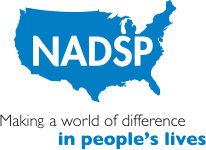
NADSP E-Badge Earner of the Month: Jodi Beck
Congratulations to Jodi Beck, who has been selected as the August 2024 NADSP E-Badge Academy Earner of the Month. Jodi is being recognized her excellent ‘Supporting Wellbeing’ E-Badge submission. This badge represents a Direct Support Professionals’ work in supporting the spiritual, emotional, and social well-being of the individual. This badge is part of the Health and Wellness CMS Core Competency. It also aligns with the NADSP Competency of Community Living Skills and Supports.
Jodi is direct support ptofessional who is part of our SUNY Microcredentialing program for New York State DSPs at SUNY Dutchess (Dutchess Community College). This is a partnership between OPWDD (New York State Office for People With Developmental Disabilities) and the State University of New York (SUNY) that has been established to support the academic and career success of direct support professionals across New York State. To learn more about this partnership, click here.
Jodi’s Experiences With The NADSP E-Badge Academy
The National Alliance for Direct Support Professionals (NADSP) recently asked Jodi about her experiences with the NADSP E-Badge Academy. The questions covered how she carries out her work as a direct support professional, the skill sets she demonstrates on a daily basis, the impact that the E-Badge Academy has had on her professional recognition, and how she gets credit for competency.
Describe the story you shared in carrying out that competency:
A student I work with often displayed signs of anxiety, particularly during transitions between activities. She would become visibly tense, fidget, and cry. To support her emotional well-being, I implemented several strategies tailored to help her manage her anxiety.
First, I introduced a visual schedule to provide her with a clear and predictable structure of the day. Knowing what to expect helped reduce her anxiety about transitions. I also incorporated regular, brief mindfulness exercises, such as deep breathing and guided imagery, into our daily routine. These exercises were designed to help all students develop tools for self-regulation.
Additionally, I created a “calm corner” in the classroom, a designated safe space with soft cushions, stress balls, and calming visuals. When she or any other student felt overwhelmed, they had the option to spend a few minutes in this corner to regain composure.
To further support this student, I worked with her parents and our school counselor to develop a personalized anxiety plan. This plan included specific strategies, such as providing her with a five-minute warning before transitions and allowing her to have a small, familiar object (a small stuffed animal) during stressful times to provide comfort.
Through consistent application of these strategies, the student began to show significant improvement. She became more confident and less anxious, and her participation in classroom activities increased. The combination of a structured environment, mindfulness practices, and a personalized support plan enhanced her emotional well-being and allowed her to thrive academically and socially.
Why is this competency so important to DSPs?
This competency is crucial because it ensures that Direct Support Professionals (DSPs) can effectively promote the physical, emotional, and social well-being of the individuals they support. It helps DSPs create environments where individuals can thrive and feel valued.
How have you used this competency in your work?
I have used this competency by actively listening to the needs and preferences of the individuals I support, creating personalized care plans, and advocating for their mental and physical health needs.
How can other DSPs replicate your practices?
Other DSPs can replicate my practices by prioritizing open communication with those they support, staying informed about best practices in well-being, and continuously seeking feedback to improve their approaches. Additionally, engaging in professional development opportunities and fostering a supportive team environment are key.
How does the NADSP E-Badge Academy benefit your agency?
The NADSP E-Badge Academy benefits my agency by providing a structured framework for professional development, ensuring our staff is skilled and knowledgeable. This leads to higher quality care, increased staff retention, and a positive reputation in the community.
How does NADSP E-Badge Academy benefit the people you support?
The people we support benefit from the NADSP E-Badge Academy because they receive care from well-trained, competent professionals. This leads to improved outcomes in their overall well-being, greater independence, and a better quality of life.
What does the future hold for your involvement in the NADSP E-Badge Academy?
In the future, I plan to continue advancing my skills through additional badges and certifications. I am preparing for a new journey as a DSP when I retire from teaching. In the long run, I aim to take on a mentoring role to help newer DSPs navigate the academy and encourage a culture of continuous learning within my agency..
How has NADSP E-Badge Academy affected your professional image?
The NADSP E-Badge Academy has enhanced my professional image by providing formal recognition of my skills and dedication. I feel a stronger professional identity and greater pride in my occupation, knowing that I am equipped to provide the best possible support. I definitely feel more skilled. The training and knowledge gained through the E-Badge Academy have significantly enhanced my competencies, enabling me to deliver higher quality support.
How has NADSP E-Badge Academy given you credit for competency?
The NADSP E-Badge Academy gives me credit for competency by validating my skills through a recognized certification process. This not only acknowledges my expertise but also provides a tangible way to demonstrate my qualifications to employers, colleagues, and the individuals I support.
Well Wishes from Jodi’s Agency
“Jodi Beck exemplifies what it means to be an effective Direct Support Professional. Through her testimonials, we can see the passion in her approach while she provides the best care possible for the individuals she serves. We are proud to highlight Jodi, her commitment to the field of direct support, and this distinguished honor of Earner of the Month. Jodi has set a high bar for DSP students that follow her path through the Direct Support Professional Microcredential Program at SUNY Dutchess.”
-Lacie Reilly, DSP Program Coordinator, SUNY Dutchess.
The NADSP E-Badge Academy
The NADSP E-Badge Academy offers Direct Support Professionals (DSPs) and Frontline Supervisors (FLSs) the ability to earn national certification through stackable electronic badges. These badges demonstrate the knowledge, skills, and values that these professionals utilize every day, recognizing the professional development that might otherwise go unacknowledged. Through the NADSP E-Badge Academy, DSPs and FLSs are acknowledged for the experience and education that they bring to the human services field.
NADSP E-Badge Academy Earners Of The Month

NADSP E-Badge Earner of the Month: Jennifer Hardin

NADSP E-Badge Earner of the Month: Julius Nyabinda

NADSP E-Badge Earner of the Month: Rhoda Mullen


